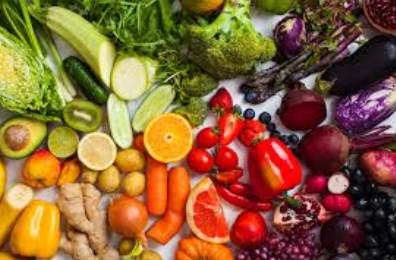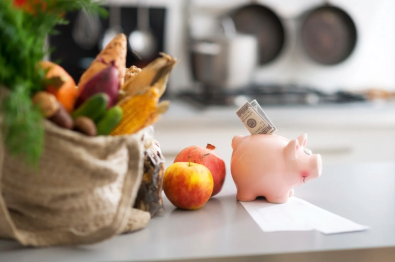Smart Living Starts Here – No Fluff!
Eating healthy can feel expensive, but it doesn’t have to be. With these healthy eating hacks on a budget, you can enjoy nutritious meals while saving money and reducing waste. These tips are perfect for anyone looking to make smarter choices without overspending.
Healthy Eating Hacks on a Budget
Hack #1: Buy Seasonal Produce

Seasonal fruits and vegetables are cheaper, fresher, and often more nutritious than out-of-season options.
How-to: Check your local farmer’s market or grocery store for seasonal deals. For example, in the fall, stock up on squash, sweet potatoes, and apples—they’re usually affordable and versatile.
Hack #2: Meal Plan Around Sales
Planning your meals based on store discounts helps you save money and cuts down on food waste. Instead of going in with a fixed shopping list, take advantage of sales and adjust your meals accordingly.
How-to: Take a few minutes to browse through weekly flyers or use apps like Flipp to keep track of discounts on proteins, grains, and vegetables. For example, if chicken thighs are on sale, plan for stir-fries or casseroles using this affordable cut of meat.
Hack #3: Buy in Bulk (But Be Selective)
Staples like rice, oats, lentils, and beans are cheaper in bulk and have a long shelf life.
How-to: Visit stores with bulk bins or buy larger packages of dry goods. Store them in airtight containers to keep them fresh.
Hack #4: Cook at Home More Often
Eating out can quickly become an expensive habit. Cooking at home is not only healthier, but it’s also much more affordable. With a little effort, you can prepare delicious, nutritious meals that save you money.
How-to: Start with simple recipes such as soups, stir-fries, or pasta dishes. To make things easier during busy weeks, try batch cooking on weekends. This will help you save time and money without compromising on the quality of your meals.
Eat healthier with these nutrition hacks.
Hack #5: Embrace Frozen Produce

Frozen fruits and vegetables are just as nutritious as fresh ones and often cost less.
How-to: Stock up on frozen broccoli, spinach, or berries for easy additions to smoothies, soups, and stir-fries. They also last longer, reducing food waste.
Hack #6: Use Cheaper Protein Options
Protein doesn’t have to break the bank—plant-based options and budget-friendly cuts of meat are great alternatives.
How-to: Incorporate eggs, canned tuna, lentils, and tofu into your meals. For example, make a lentil curry or scrambled eggs with veggies for a high-protein, low-cost meal.
Hack #7: Shop Generic Brands
Store-brand items are often just as good as name brands but come at a lower price.
How-to: Compare the ingredients of generic and branded items like pasta, canned goods, or spices. Choose the cheaper option unless there’s a noticeable quality difference.
Hack #8: Stretch Meals with Whole Grains
Adding grains like quinoa, brown rice, or barley to your meals makes them more filling and affordable.
How-to: Cook a big batch of grains at the beginning of the week and mix them into soups, salads, or stir-fries.
Hack #9: Reduce Snack Spending

Pre-packaged snacks can drain your budget quickly. Opt for homemade alternatives instead.
How-to: Make your own popcorn, energy balls, or trail mix. A bag of kernels costs less and makes more servings than a bag of chips.
Hack #10: Avoid Food Waste with Creative Leftovers
Transform leftovers into new meals instead of tossing them.
How-to: Use roasted vegetables in omelets or pasta, and turn stale bread into croutons or breadcrumbs. This minimizes waste and stretches your grocery budget.
Healthy eating on a budget is possible with just a few tweaks to your habits. Try these hacks and see how much you can save while enjoying nutritious meals. Share your favorite tips in the comments or with friends who could use these ideas!





